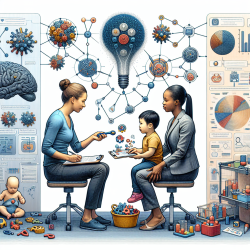Lighting the Path to Brighter Futures: Understanding Early Emotionality and ADHD
As practitioners dedicated to improving outcomes for children, understanding the early indicators of developmental disorders such as ADHD is crucial. The recent study, "Early development of negative and positive affect: Implications for ADHD symptomatology across three birth cohorts," offers valuable insights into how early emotionality can predict ADHD symptoms later in childhood.
The study highlights the importance of both negative and positive affect in infants as potential early markers for ADHD. It uses a combination of variable-centered and person-centered approaches to analyze the trajectories of infant emotionality and their correlation with ADHD symptoms in children aged 4 to 8 years.
Key Findings and Implications
One of the key findings from the study is that higher levels of negative affect in infants, even as early as 3 months, are associated with increased ADHD symptoms in childhood. This suggests that early emotionality could serve as a transdiagnostic marker for future psychopathology, including ADHD.
Interestingly, while positive affect did not reach a statistical threshold in predicting ADHD symptoms on its own, the study found that considering both positive and negative emotionality together provided additional insights. Specifically, infants with moderate, stable, or low levels of positive affect, combined with negative affect, showed a stronger correlation with ADHD symptoms.
Practical Applications for Practitioners
For practitioners, these findings underscore the importance of early assessment and monitoring of infant emotionality. By identifying infants at risk for ADHD through early emotional markers, interventions can be tailored to support the development of self-regulation and effortful control, potentially mitigating the severity of ADHD symptoms as children grow.
Here are some practical steps practitioners can take:
- Implement early screening for emotional reactivity in infants, focusing on both negative and positive affect.
- Use a holistic approach that considers both emotionality and environmental factors, such as parenting style and family history, to assess ADHD risk.
- Collaborate with parents and caregivers to develop strategies that support emotional regulation and positive affect in infants.
- Encourage further research and data collection to refine early intervention strategies and improve predictive models for ADHD.
Encouraging Further Research
While this study provides valuable insights, it also highlights the need for continued research. Replicating these findings in diverse populations and exploring the role of environmental factors can enhance our understanding of ADHD's developmental pathways.
Practitioners are encouraged to engage with ongoing research and contribute to the growing body of knowledge in this area. By doing so, we can collectively work towards creating brighter futures for children at risk of ADHD.
To read the original research paper, please follow this link: Early development of negative and positive affect: Implications for ADHD symptomatology across three birth cohorts.










